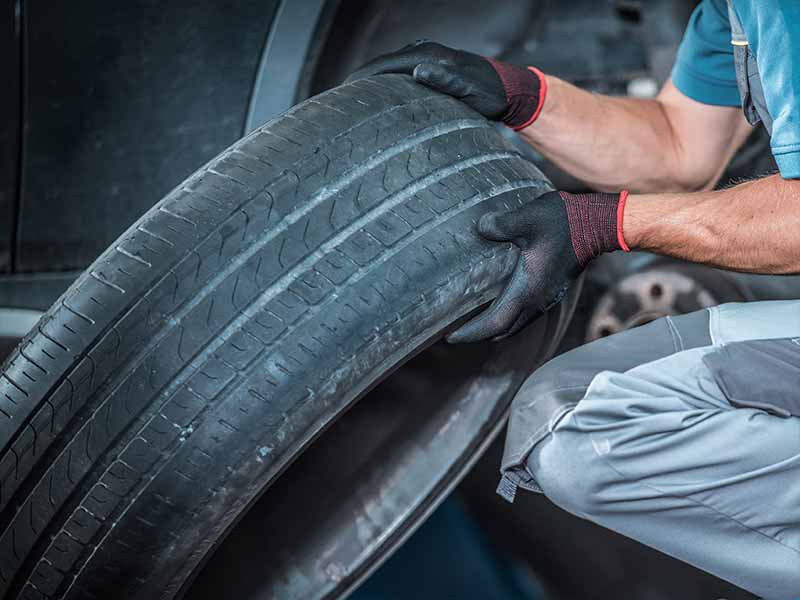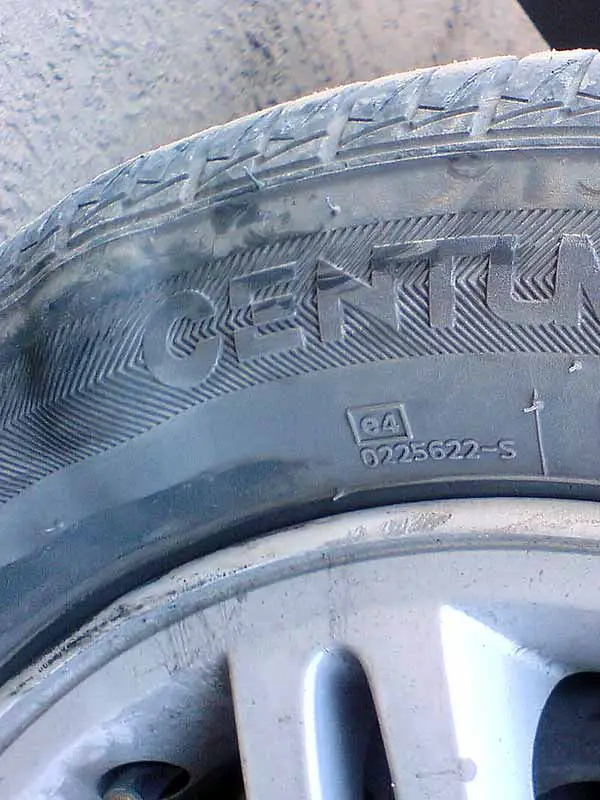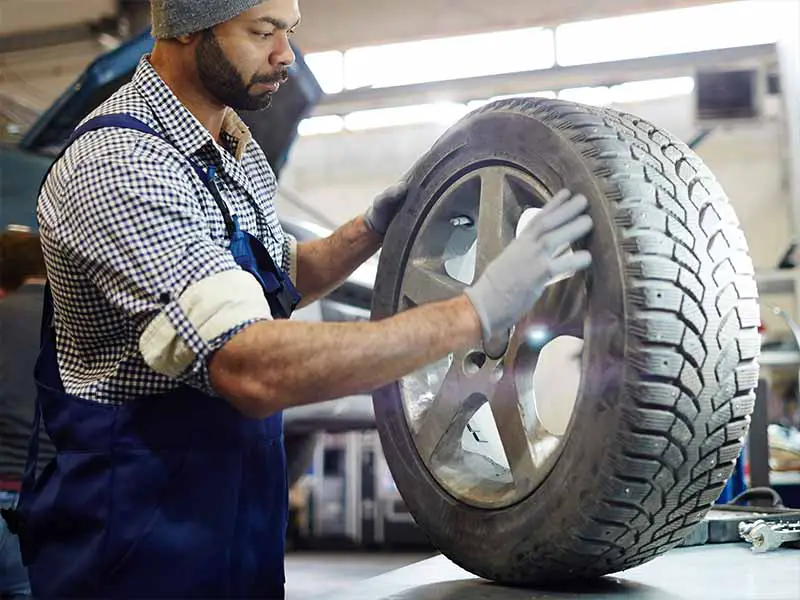Tire noise is fairly common immediately after having your tires rotated. Louder than normal road noise or humming is typical and usually fades away after 50 miles or so as the tires wear into their new positions.
A helicopter sound is more significant and can be a sign of problems that need to be fixed to ensure that your tires will wear evenly and last as long as possible.
Let’s go over the possible causes and solutions of helicopter noise coming from your tires after having them rotated.
Helicopter Noise After Tire Rotation
Helicopter noise after tire rotation is usually a sign of a problem with your tires that needs to be addressed. If you haven’t had your tires aligned and balanced recently, you should have this tire service performed.
It won’t immediately solve the noise, but it will address the underlying causes of the uneven wear that causes the noise. The tire noise should fade as the tire wear begins to even out.

Causes Of Helicopter Tire Noise After Rotation
Tire noise immediately after tire rotation helps identify what the source of the noise could be. The following are the most likely reasons for the annoying tire noise.
Uneven Tire Wear Patterns
A common cause of many different types of tire noise after tire rotation is uneven wear. Tires with uneven wear patterns typically don’t make helicopter sounds unless the uneven wear is unusually bad.
Uneven tire wear patterns are a symptom of an underlying problem. An alignment problem is the most likely cause of uneven tire wear that would cause this type of noise. Whether you’ve had an alignment service performed recently or not, you should consider having one performed.
Ensuring your tires are properly aligned will not immediately resolve the problem and make the noise go away, but it will potentially solve one of the potential underlying problems and prevent worsening of the problem and accelerated tire wear and more noise and vibrations.
If uneven tire wear was the problem, it will take time for the tires to wear down and smooth out.
Out Of Balance Tire
An out of balance tire can cause tire noise. The noise may come from the imbalance itself or it can be due to uneven wear patterns caused by the imbalance of the tire.
When tires are rotated, often problems with rear tires become suddenly quite noticeable. Balance problems with rear tires are a very common source of problems after rotation specifically because the vibrations are much more difficult to notice in tires on the rear.
When an unbalanced rear tire is moved to the front axle it can cause vibrations to be more easily felt and noises to become much easier to hear.
Tires can become unbalanced due to regular tire wear or due to a wheel weight coming off of the wheel. Rebalancing tires regularly will help avoid these types of problems from occurring.
Rebalancing tires if you are experiencing a helicopter noise will potentially immediately solve the problem if it is strictly caused by the tire being so unbalanced that it was the sole source of the sound.
If the source of the sound was poor tire wear patterns caused by the wheel assembly being out of balance, it will take some time for the tires to wear down and smooth out before the noise begins to go away.

Damaged Tire
Broken belts in damaged tires can cause tire noise. The source of the noise could be from the damage itself or uneven wear caused by the damaged to the tire.
Like with unbalanced tires, damaged tires can go unnoticed more easily on the rear. So when tires are rotated and rear tires move to the front axle with damage, the noises they can create can become much more noticeable.
Tire damage can come from defects, but is much more likely to be the result of potholes and curb strikes.
The solution here is to inspect tires for damage that can be seen as bulges. Sidewall bulges or uneven tread surfaces can be signs of broken belts within the tire.
If damage is found the tire should be replaced. It’s best to replace tires in pairs to ensure handling isn’t compromised.
Road Debris In Tire
The most unlikely cause of a helicopter noise after tire rotation is road debris. It isn’t impossible though. It’s most likely that any punctures and embedded road debris will be noticed during tire rotation service.
It is possible that the debris was picked up shortly after the rotation service was performed. Tires should be inspected for road debris in addition to other types of tire damage.
Is It Normal For Tires To Make Noise After Rotation?
Tire noise after rotation is very common. The purpose of tire rotation is to even out tire wear across the entire surface of the tread. When tires are rotated to new positions on your car or truck, louder road noise is common until the tires wear into their new positions.
If the tires have uneven wear patterns, the noise can be significant enough to cause helicopter-like sounds.
It should be pointed out that if significant tire noise persists for more than 50 miles after a tire rotation was performed, a rotation and balance service should be performed to address the underlying causes of tire noise.
Will Tires Quiet Down After Tire Rotation
Tires typically begin to quiet down after tire rotation after 50 miles unless the cause of the noise is unusually significant.
Even if tire noise does quiet down, it can come back if the underlying cause of tire noise isn’t resolved. Uneven wear patterns will cause noise, especially after tire rotation. The cause of the uneven wear needs to be address to ensure the uneven wear doesn’t come back, and with it, excessive tire noise.
Rough Ride After Tire Rotation
If you’re experiencing a rough ride after having your tires rotated, the cause is almost certainly due to uneven tire wear. This wear can also be the cause of helicopter noise.
Making sure that your tires are balanced and wheel assemblies are properly aligned will address the main potential underlaying causes of significant uneven wear patterns which can cause a rough feeling ride after rotating tires.
Resources
Below are some links you may find helpful when learning about tires
- Causes and types of tire damage – Continental Tire
- Beware these early warning signs of tire failure – Consumer Reports
Final Thoughts
Helicopter noise from tires after a tire rotation shouldn’t be ignored. This loud noise is a sign of an underlying problem.
The most likely problem is severe uneven tire wear patterns. Properly aligning and balancing your tires will address the main causes of uneven wear.
Tire damage and lodged road debris are also potential sources of the sound although these problems are much more likely to be discovered by the tech who performs your tire rotation. Sometimes this damage doesn’t get noticed and needs to be addressed when it’s discovered later.





